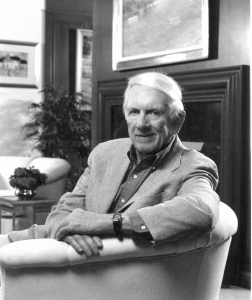This post is part of The Plank Center’s Legacies from Legends in PR Series that was begun in recognition of the 40th Anniversary of the Public Relations Student Society of America in 2007.
Joined Johnson & Johnson in 1957. Directed the company’s public relations response to the Tylenol crises in 1982 and 1986; retired as corporate vice president of public relations in 1990. Recipient of PRSA’s Gold Anvil Award (1989), the Ferguson Award (2004) and the Atlas Award (1998) for lifetime achievement in international public relations, as well as the Arthur W. Page Society’s Hall of Fame Award (1994).
Learn to write with clarity and persuasion, and get to know the business you are serving – the problems and the opportunities.
Spend time developing your “good judgment;” it might be your shining quality. Don’t be reluctant to become the “loyal opposition” and take an opposite stand if you feel it serves the public interest. Good judgment will tell you when the time is right to do this.
Your goal should be to raise the level of public communications by making truth, integrity and responsibility the standards that may not be compromised.
As communicators you are cast in the role of protecting and enhancing your company’s reputation. More than anyone else in the company, this is your responsibility.
Tell the truth. Never lie to the press. But remember you are not obligated to tell everything you know about a given situation.
Some say ethics cannot be taught. But certainly your ethical conduct can be honed as you become involved in complex situations. Don’t compromise your ethics. It is who you are.
Every failure to communicate effectively and ethically carries with it a lesson that we must learn and apply, especially in the business world, and especially in today’s contentious business climate.
Public relations is a fascinating business with a unique personality. It is rarely dull. Don’t be dull.
If you are fortunate enough to work for a CEO, offer him or her friendship and understanding along with your best skills. It is lonely at the top.
Formal learning does not end with the college degree. Experience is the great teacher for the long term.
When you are sitting around the boardroom table with colleagues from other disciplines remember that your input will likely be different, as it should be, based on your training and your experience. Express yourself thoughtfully. Strive to be a problem solver.
Enjoy your work. It will reflect in your attitude and your performance.
Published: 2007
* Deceased (1925-2013)
